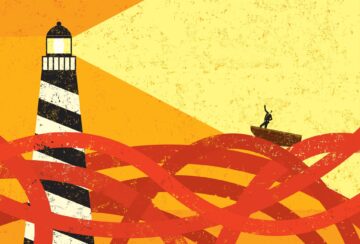Jamil Zaki in Time Magazine:
 In a letter to his wife, Olga, the playwright and political dissident Václav Havel wrote, “Hope is a dimension of the spirit. It is not outside us, but within us.” Havel sent the note from a Prague jail, after being imprisoned for criticizing his country’s regime from 1979 until 1983. Havel could have been forgiven for rejecting hope. After the Prague Spring, a brief period of political protest and social liberalization, Czechoslovakia had veered back towards Soviet rule. Authoritarians had tightened their grip on law, media, and culture, Havel forced to survey it all from a tiny cell. Some Americans might feel that the current moment runs parallel with Havel’s, in the wake of Donald Trump’s election to a second term as President. Many Democrats have abandoned hope in favor of cynicism: deciding that most of the voting public are selfish, bigoted enemies of democracy.
In a letter to his wife, Olga, the playwright and political dissident Václav Havel wrote, “Hope is a dimension of the spirit. It is not outside us, but within us.” Havel sent the note from a Prague jail, after being imprisoned for criticizing his country’s regime from 1979 until 1983. Havel could have been forgiven for rejecting hope. After the Prague Spring, a brief period of political protest and social liberalization, Czechoslovakia had veered back towards Soviet rule. Authoritarians had tightened their grip on law, media, and culture, Havel forced to survey it all from a tiny cell. Some Americans might feel that the current moment runs parallel with Havel’s, in the wake of Donald Trump’s election to a second term as President. Many Democrats have abandoned hope in favor of cynicism: deciding that most of the voting public are selfish, bigoted enemies of democracy.
This is an understandable response, but perhaps not a helpful one. Writing off vast swaths of Americans fuels trends most of the nation abhors. Research finds that people who mistrust their fellow citizens are most likely to support “strong man” leaders who promise to protect people while stripping away their freedoms. Donald Trump capitalized on this phenomenon, offering a fever dream of American carnage that beguiled many people into his camp. For instance, violent crime has been declining across the U.S. for decades, but many Americans—especially if they watch conservative media—falsely believe it’s on the rise. People who held that dark view favored Trump by more than 25 points. It’s not just crime. According to the Pew Research Center, Americans’ faith in institutions—including education, science, and government—has plummeted, but this drop is steepest among Republicans.
More here.
Enjoying the content on 3QD? Help keep us going by donating now.
